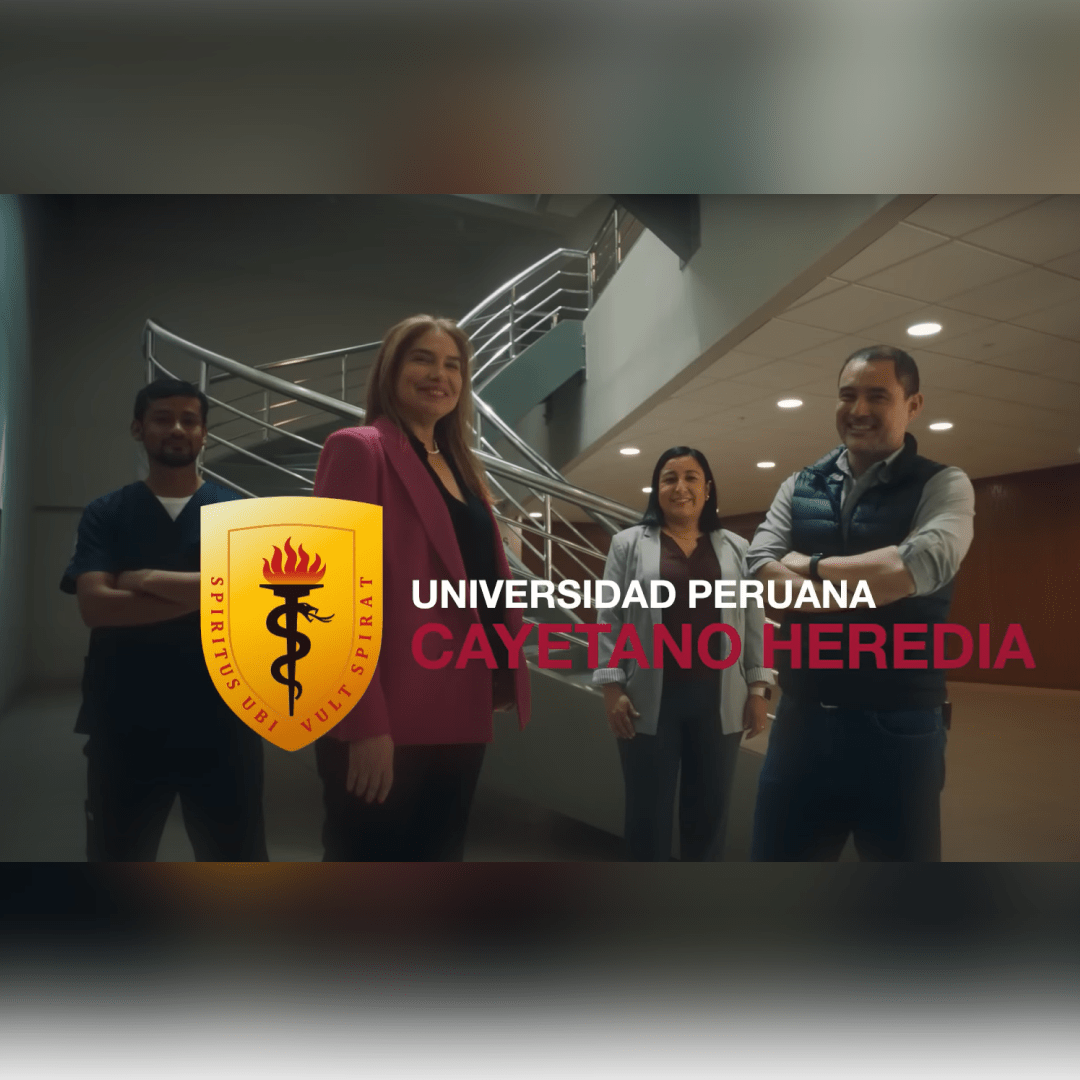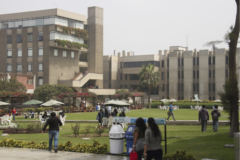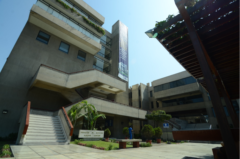About Us
Learn more about our university and its history.
About Cayetano
Our students choose Universidad Peruana Cayetano Heredia for many reasons, mainly for its outstanding academic quality. They also give preference to teaching staff committed to both generating valuable knowledge useful for boosting development and engaging with students determined in their goals and eager to discover new trends. Beyond maintaining the highest international academic and research standards, at Cayetano, we are committed to society. Together, researchers, teaching staff, and students strive to make a significant contribution to promote well-being in all the fields we work in.
Our Organization
Our Mission
We at Universidad Peruana Cayetano Heredia, looking back at our 60 years of history, project ourselves into the future to strengthen and expand our contribution to sustainable development and the solution of major national and global problems. We are committed to democracy, human rights, gender equality, social inclusion, respect for diversity, academic freedom, and the creation of opportunities. Thus, we consolidate our international prestige and social engagement.
We establish ourselves as a benchmark for high-quality academic research and interdisciplinary innovation. We are an integral part of international networks and alliances, with high mobility of teachers and students involved in relevant academic programs and collaborative research. We are a hub for innovation and development aimed at advancing science and technological transfer, an intrinsic element of our institutional culture.
Our university is characterized by its highly qualified faculty, researchers, and administrative staff, offering exceptional work conditions and ample opportunities for professional and continuous career development. We pursue professional management based on the most efficient processes and results, tailored to users’ needs and with a solid technological component based on digital transformation. Last but not least, we feature a sound and sustainable financial standing.
Our Vision
We at Universidad Peruana Cayetano Heredia —a private non-profit associative management institution and a significant actor in the national educational landscape— aim to turn individuals into agents of scientific, technological, social, and environmental change through lifelong education. We foster socially and ethically committed professionals who provide comprehensive solutions based on solid research and respect for diversity and the environment, at the undergraduate, graduate, specialization, and continuous education levels. We ensure academic excellence through continuous high-quality education processes, renewing educational models in line with the evolution of global challenges to include new disciplines, and offering cutting-edge and comprehensive education with an emphasis on culture, art, and sports.
Our efforts are aimed at young graduates from basic and technical education, as well as professionals working in the fields of life sciences, health, education, engineering, economics and management, social sciences, and humanities, ensuring high employability, both nationally and internationally.
Social Responsibility
Our students choose Universidad Peruana Cayetano Heredia for many reasons, mainly because of our high academic quality. Also, their preference goes to teachers such as ours, who are highly committed to generating valuable knowledge to drive development and engaging with students who are determined in their goals and eager to discover new trends. Beyond striving for the highest international academic and research standards, at Cayetano we are strongly committed to society. Together, researchers, teaching staff, and students strive to make a significant contribution to promoting well-being in all the fields we work in.
Our History
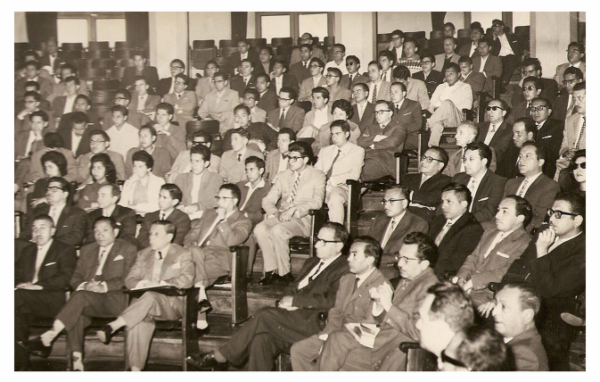
Foundation of Cayetano
The history of Universidad Peruana Cayetano Heredia is closely linked to the development of medicine and scientific research in Peru. It was founded in 1961 when a group of teachers with extensive experience in teaching medicine at the most prestigious public university in the country had the vision of creating a university with the highest academic standards to contribute to research in health and sciences in Peru and abroad. These visionary doctors set up the Cayetano Heredia Union of Medical Faculty on July 25, 1961, which started operating at the premises of the National Academy of Medicine
From these initial steps, the founders received clear support from the international and local community to establish a new center of studies for the health sciences. Local support became tangible with the creation of an Economic Board chaired by Mr. Enrique Ayulo Pardo. After arduous and relentless work by the union members, the Peruvian government officially established the University of Medical and Biological Sciences on September 22, 1961, a name that would later change to Universidad Peruana Cayetano Heredia.
In April 1961, the first admission exam was administered, serving as a future model for other universities in the country. The official opening of the new university took place on June 18, 1962, under Dr. Honorio Delgado and Dr. Alberto Hurtado’s leadership
Numerous academic degree courses and research programs have been developed for the benefit of our students. Alongside the degree course in Medicine, further degree courses in other fields such as Dentistry, Veterinary Medicine, and, subsequently, Psychology, Biology, Chemistry, Pharmacy, Biochemistry, and Nursing have been added. In 2001, teacher training programs were initiated at the Faculty of Education, and, since 2015, undergraduate programs in Primary Education and Early Childhood Education have been offered. The year 2015 also witnessed the launch of the Public Health and Global Health degree courses to address society’s needs by focusing on prevention rather than treatment of diseases.
In 2017, in cooperation with the Pontifical Catholic University of Peru (PUCP), the Biomedical Engineering degree course was launched, combining PUCP’s expertise in engineering with Cayetano’s leadership in health and life sciences. In 2018, the Environmental Engineering degree course was introduced, becoming the second program in the new Faculty of Engineering. Subsequently, in 2019, the Computer Engineering degree course was launched, Cayetano’s most recent one, aimed at providing solutions to complex problems both in the scientific domain and different business contexts.
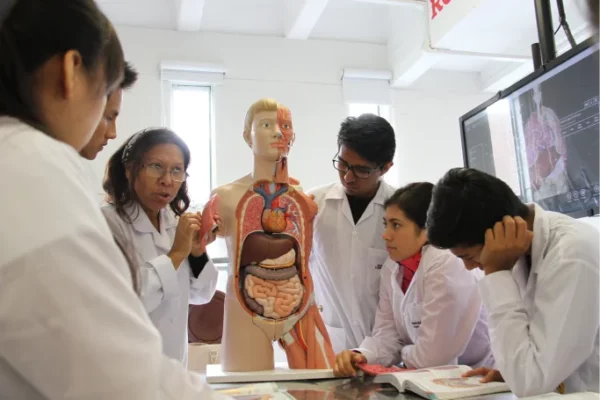
In 2007, Universidad Peruana Cayetano Heredia became the first university in the country to be internationally accredited by the International Quality Institute (IAC) of the Interuniversity Development Center (CINDA). The university’s international accreditation was renewed in 2010 and, in 2016, Cayetano was accredited for a period of five years in institutional management, degree-oriented teaching, research, and postgraduate education. Subsequently, CINDA’s IAC began the process of international accreditation for undergraduate programs, granting accreditation to the Biology, Nursing, and Dentistry courses.
Contribution to Global Research and Well-Being
Regarding research, many teachers and students have contributed to projects and solutions with global impact in response to the COVID-19 pandemic. This comprises Dr. Mirko Zimic, head of the Bioinformatics and Molecular Biology Unit, who is leading two projects on coronavirus vaccines. Similarly, Dr. Edward Málaga-Trillo and his team have been working on a rapid molecular test project for detecting COVID-19.
The university’s impact on research, both nationally and internationally, is possible thanks to the vision and institutional policies that have always been oriented toward Peru’s real needs. This significant contribution is reflected in the development of pioneering community education programs and contributions to finding solutions to various health issues, such as problems related to high-altitude adaptation, diseases affecting mining workers, goiter, acute dehydration therapy, cholera control, studies and treatments for tuberculosis, sexually transmitted diseases, and other endemic diseases affecting vulnerable populations across the country.
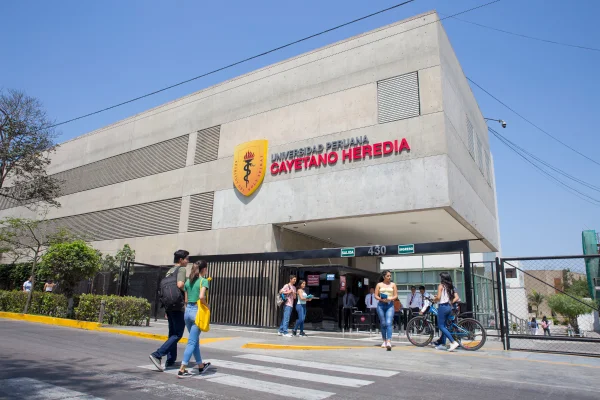
At UPCH, we prepare students with a global vision, based on the principles that guided our founders: Honorio Delgado, Alberto Hurtado, Carlos Monge C., Víctor Alzamora C., Javier Mariátegui, Uriel García, and Mariano Querol, among others, as well as our other former rectors (in addition to the first three mentioned), Dr. Enrique Fernández, Homero Silva, Alberto Cazorla, Carlos Vidal, Roger Guerra-García, and Oswaldo Zegarra.
Those who currently carry on their legacy make sure our institution continues fostering research and reflection, cultivating knowledge with all necessary resources. A renowned university takes root in the society it serves, while also opening itself to the world for constant dialogue and the exchange of knowledge. Undoubtedly, our more than 11,000 graduates from a vast array of fields have made their mark in their professions, both nationally and internationally.
Regarding research, many teachers and students have contributed to projects and solutions with global impact in response to the COVID-19 pandemic. This comprises Dr. Mirko Zimic, head of the Bioinformatics and Molecular Biology Unit, who is leading two projects on coronavirus vaccines. Similarly, Dr. Edward Málaga-Trillo and his team have been working on a rapid molecular test project for detecting COVID-19. The university’s impact on research, both nationally and internationally, is possible thanks to the vision and institutional policies that have always been oriented towards Peru’s real needs. This significant contribution is reflected in the development of pioneering community education programs and contributions to finding solutions to various health issues, such as problems related to high-altitude adaptation, diseases affecting mining workers, goiter, acute dehydration therapy, cholera control, studies and treatments for tuberculosis, sexually transmitted diseases, and other endemic diseases affecting vulnerable populations across the country.


